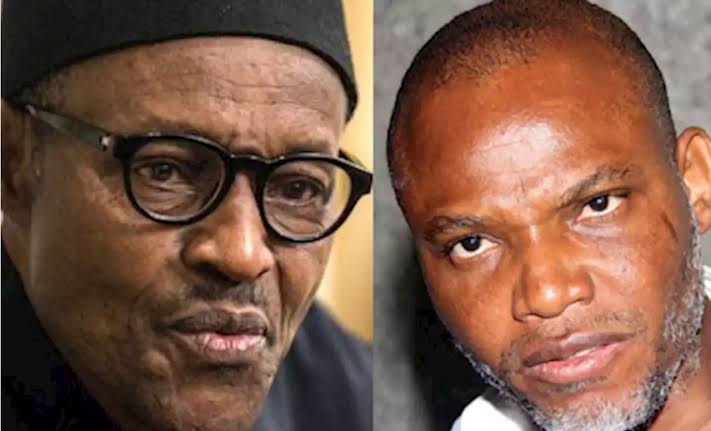More details obtained have shown that the leader of the Indigenous People Of Biafra, Nnamdi Kanu was kidnapped in Nairobi, Kenya by the President Muhammadu Buhari’s Government, says George Wajackoyah, a counsel representing the detained separatist leader.
“We have copies of his passport and a stamp that he was indeed in Kenya. We also have evidence he was in his residence on a particular day. We also have material proof that he was at the airport on a particular day to meet a friend and there he was arrested.

Buhari, Nnamdi Kanu
“Definitely, he was kidnapped,” Mr Wajackoyah said in an audiotape.
IGBERE TV recalls that Kanu was repatriated back to Nigeria on July 1 after disappearing from the country following a military raid in his abode.
Nigerian Government had provided a murky explanation of how the IPOB leader was “intercepted through the collaborative efforts of the Nigerian intelligence and security services,” failing to further elaborate on the circumstances of Kanu’s capture.
The Kenyan government also strongly denied involvement in the whole process. It’s High Commissioner to Nigeria, Wilfred Machage, described the claim that Kanu was arrested in the East African country as “deliberately concocted to fuel antagonistic feelings in the minds of certain sections of the Nigerian people against the people of Kenya.”
But Wajackoyah told BBC that several findings indicated that the IPOB leader was in Kenya and that he had caught up with a friend at the airport on the day he was “kidnapped”.
He also disclosed that a petition had been filed against the Kenyan government for its involvement in the “unconstitutional and unlawful” arrest and extradition of Mr Kanu.
“We filed a petition against the Kenyan government and various actors in this case for their unconstitutional and unlawful removal which denied our client his human rights, which was engineered by first to fifth respondents in the denial of fair administrative action and in the violation of human rights of Nnamdi Kanu,” he said.
The respondents are Kenya’s Interior CS, the Director of Immigration, the Director of Criminal Investigations, OCPD Jomo Kenyatta International Airport, and the Attorney General.
On how long the Kenyan government has to respond to the petition, the lawyer said “We are serving the respondents and from there, we take on. It’s not an issue of the Kenyan government responding but it’s a judicial matter,” adding that it was served under certificate of urgency.
Wajackoyah questioned why the Kenyan government would “deport” a British citizen to Nigerian territory, despite the fact that Mr Kanu renounced his citizenship as a Nigerian.
Although he admitted that Kanu could be extradited from Kenya, he argued that extradition has to follow due process which the Buhari regime refused to follow.
“You can’t just pick up somebody and throw him. That’s barbaric. It’s outlawed by international law even by our own constitution,” he explained.
“It is an abuse of the court process for the Nigerian court to try a British citizen who has no connection with Nigeria and without due process,” he added.
A July report published in The Guardian, a British outlet, also indicated that Mr Kanu’s UK passport remained in Kenya, after his extradition.
STAY WITH IGBERE TV. AFRICA’S NO1 COMMUNITY TV.







